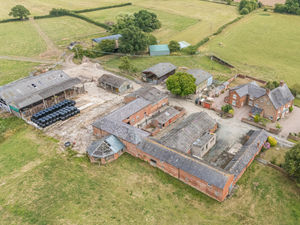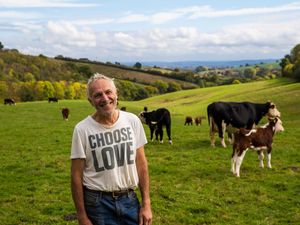Rain welcome but food price hike on way, warn Shropshire farmers
Rain has been welcomed by farmers in Shropshire and Mid Wales – but they warn it won’t prevent a crisis that will see prices rise.
Milk, meat and vegetables are likely to be in short supply, pushing up the amount we pay in supermarkets.
The hike in prices is expected to be around five per cent, all as a result of the extreme weather we have experienced this year.
Extended spells of freezing and baking weather seen during the winter and summer will likely increase household food bills by an estimated £7.15 a month, the Centre for Economics and Business Research (Cebr) says.
Richard Yates, chairman of the NFU West Midlands Livestock Board, warned milk and meat may be in shorter supply than usual this year as farmers continue to count the cost of this summer’s heatwave.
Mr Yates, who has a farm in Middleton Scriven near Bridgnorth, said: “The rain has come and we are glad of it. The countryside has turned from a desert into green. But there is concern how we are going to feed our livestock this winter.”
The cold snap brought on by the Beast from the East has already been blamed for a slump in the economy at the start of the year, while some industries were adversely affected by heatwave conditions over the summer.
Cebr said domestic food production has been hit by weather extremes that have put “particular stress on farming costs and yields”.
Mr Yates said: “Farmers will hopefully take another cut of silage and we hope the autumn will be benign to extend the grazing period.
“Some farmers have experienced acceptable harvests. Others with lighter, sandier soil have had reduced yields. On the whole the harvest in Shropshire has been an average one.
Depleted
“It is an expensive time for farmers. Animals stores are depleted from the wet and cold winter we had.
“Feed bills go up, cereal prices increase, and someone will have to bear the brunt.”
Through harvest reductions, prices should go up.
“The Beast from the East meant greater lamb losses this spring so less lambs will be marketed through now until Easter.
“My cows haven’t milked so well through a shortage of grass so I am having to buy more concentrates to feed them. Shortage of milk should lead to price increases.”
Between March and July, the wholesale ‘farm gate’ prices of some staples rocketed by up to 80 per cent.
The price of wheat for bread rose by a fifth, strawberries by 28 per cent, carrots by 41 per cent and lettuce by 61 per cent.
The farm gate price of carrots rose by 80 per cent, according to European Commission figures used by the economists.
The Cebr said: “Summer 2018 has been one of the warmest in living memory, with above average temperatures recorded since April and dry spells lasting more than 50 days in parts of the country.
“While this has made Britain’s weather more conducive to barbecuing, it looks set to raise the price of the food on the grill and the drink in hand.”




